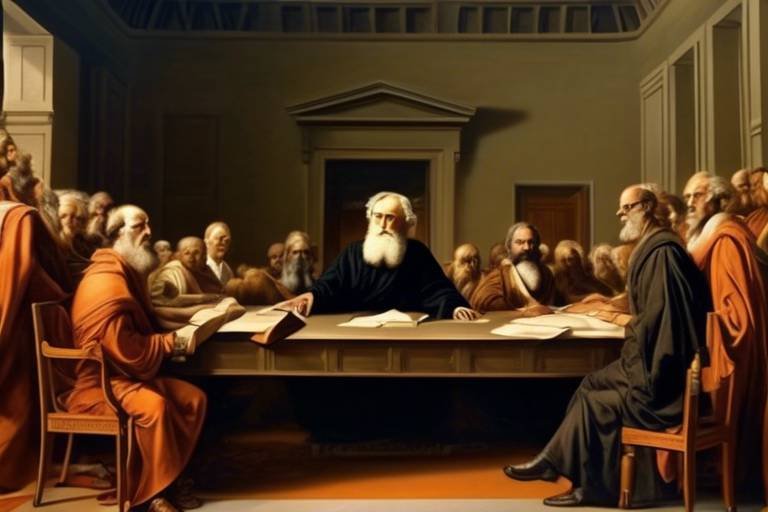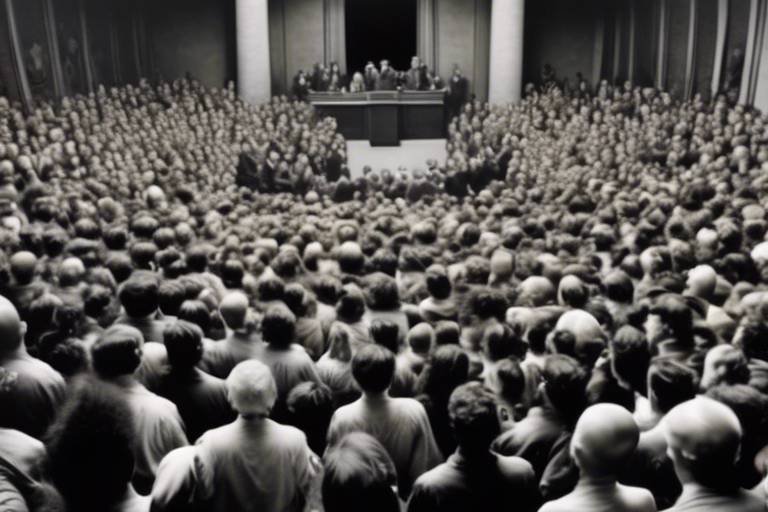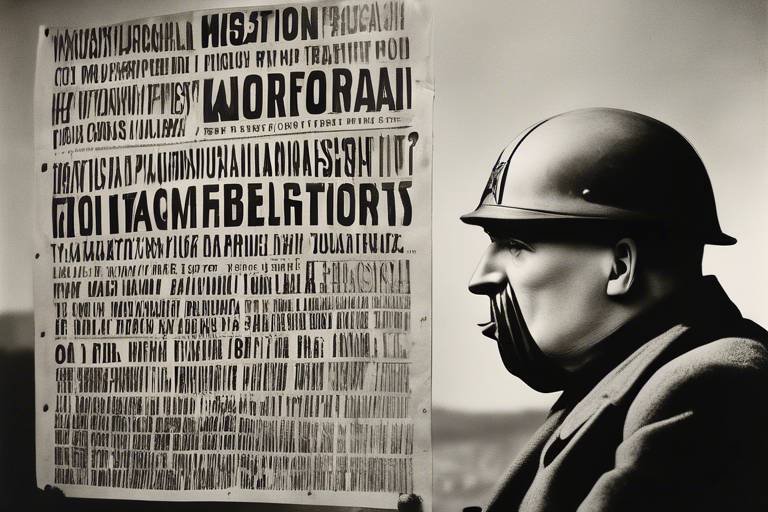The Philosophy of Politics: Aristotle vs. Plato
The world of political philosophy is a rich tapestry woven from the thoughts and ideas of great thinkers, and among the most influential are Aristotle and Plato. These two ancient philosophers laid the groundwork for how we understand governance, ethics, and the role of individuals within society. Their contrasting views not only shaped their own time but also continue to resonate in modern political discourse. Imagine standing at a crossroads: on one path, you have Plato’s vision of a perfect society led by wise rulers; on the other, Aristotle’s pragmatic approach that emphasizes the significance of real-world governance. This article delves into their philosophies, exploring how their ideas can illuminate the complexities of contemporary politics.
Plato envisioned a utopian society governed by philosopher-kings, individuals who possess both wisdom and virtue. In his work, "The Republic," he emphasizes the importance of justice and the ideal forms, suggesting that only those who understand these forms can lead effectively. For Plato, the ideal state is not merely a theoretical construct; it is a blueprint for achieving the highest good. His concept of the ideal state remains influential in political theory today, prompting us to ask: what does a just society look like? Plato’s answer lies in a structured society where every individual plays a specific role, contributing to the harmony and well-being of the whole.
In stark contrast, Aristotle approached politics from a pragmatic standpoint. Rather than dreaming of an ideal state, he focused on the existing states and their functions. Aristotle believed that understanding human nature is essential for effective governance. His analysis offers a realistic framework for understanding political systems, emphasizing that politics is rooted in ethics. He argued that a good political system cultivates virtuous citizens for a stable society. This leads us to consider: how do our political structures shape our moral character? Aristotle would argue that a society's health depends on the virtue of its citizens and leaders alike.
Central to Plato's philosophy is the Theory of Forms, which posits that non-material abstract forms represent the most accurate reality. This theory underpins his political philosophy, suggesting that true knowledge leads to a just society. For Plato, the physical world is merely a shadow of the true reality, which can only be grasped through philosophical inquiry. This idea raises intriguing questions about the nature of truth and knowledge: can we ever truly understand the essence of justice or goodness, or are we forever confined to our imperfect perceptions?
In the Allegory of the Cave, Plato illustrates the journey from ignorance to enlightenment. This powerful metaphor emphasizes the role of education in achieving a just society through informed leadership. Imagine prisoners chained in a dark cave, only able to see shadows of objects passing by. When one prisoner escapes and discovers the outside world, he realizes the truth and returns to enlighten the others. However, they resist, preferring the comfort of their familiar shadows. This allegory challenges us to consider: how often do we cling to our misconceptions instead of seeking the light of knowledge?
Plato argues that only philosopher-kings, who understand the forms and possess wisdom, are fit to rule. He believed that this elite class would ensure that decisions are made for the greater good rather than personal gain. However, one must ponder: can a single class of rulers truly represent the diverse interests of society? This question leads us to explore the implications of such a governance structure and whether it can be effectively implemented in practice.
Aristotle, on the other hand, believed that politics is deeply intertwined with ethics. He emphasized the importance of virtue in leadership, arguing that a good political system cultivates virtuous citizens for a stable society. Aristotle’s focus on the practical aspects of governance encourages active participation among citizens, fostering a sense of community and responsibility. This raises an important point: how can we cultivate political virtue in ourselves and our leaders? Aristotle's teachings suggest that fostering ethical behavior and civic engagement is crucial for a thriving political community.
Examining the differences between Plato's idealism and Aristotle's realism reveals profound insights into their respective views on governance, justice, and the role of citizens within the political framework. While Plato's vision is aspirational, Aristotle's perspective is grounded in the realities of human behavior and societal dynamics. This comparative analysis not only enriches our understanding of their philosophies but also invites us to reflect on the nature of governance in our own lives.
Plato viewed citizens primarily as subjects to the ruling class, whereas Aristotle believed in active participation. He argued that citizens should engage in governance for a healthy political community. This distinction leads us to consider: what is the ideal role of citizens in a democracy? Should they be passive observers or active participants? Aristotle’s advocacy for civic engagement suggests that a vibrant democracy relies on the involvement of its citizens, fostering accountability and responsiveness in governance.
The philosophies of Aristotle and Plato continue to influence contemporary political thought, shaping discussions around governance, justice, and the ideal role of citizens in society. Their ideas prompt us to ask critical questions about our political systems: Are we striving for an ideal society, or are we grounded in the realities of human nature? As we navigate the complexities of modern governance, the insights of these ancient philosophers remind us of the enduring relevance of their ideas.
- What are the main differences between Aristotle and Plato's political philosophies?
Aristotle focused on practical governance and the role of citizens, while Plato emphasized an ideal society governed by philosopher-kings.
- How do Plato's theories apply to modern politics?
Plato's ideas about justice and the role of knowledge in governance continue to influence discussions about leadership and ethical decision-making.
- What is the significance of Aristotle's concept of virtue in politics?
Aristotle believed that a virtuous citizenry is essential for a stable and just political system, highlighting the importance of ethics in governance.

Plato's Ideal State
Plato, one of the most influential philosophers in Western thought, had a vision of a perfect society that has captivated the minds of many for centuries. His concept of the ideal state is intricately woven into his philosophical beliefs, primarily focusing on the idea of justice and the role of the philosopher-king. Imagine a world where the rulers are not just powerful individuals but wise sages, equipped with the knowledge of the true forms of justice and goodness. This is the essence of Plato's ideal state, a realm where the pursuit of the common good takes precedence over personal interests.
In Plato's view, the ideal state is structured in a way that ensures harmony and justice among its citizens. He proposed a tripartite society composed of three distinct classes: the rulers (philosopher-kings), the guardians (warriors), and the producers (farmers, artisans, and merchants). Each class has its own role, contributing to the overall stability and functionality of the state. This classification is not just arbitrary; it reflects Plato's belief in the natural abilities of individuals, suggesting that people are suited for different roles based on their inherent qualities.
To better understand Plato's vision, let’s break down the key components of his ideal state:
- Justice: For Plato, justice is the ultimate virtue that binds society together. Each class must perform its designated role harmoniously, ensuring that the state functions efficiently.
- Philosopher-Kings: The rulers are not merely politicians but philosophers who understand the true nature of reality. They are trained to grasp the forms, which are the perfect ideals of all things.
- Education: Education plays a crucial role in shaping the rulers. Plato believed that through rigorous education, individuals could ascend from the shadows of ignorance into the light of knowledge.
Plato's ideal state is not just a theoretical construct; it serves as a critique of the existing political systems of his time. He was disillusioned with the democratic practices of Athens, which he viewed as chaotic and prone to manipulation by demagogues. In contrast, his ideal state is designed to eliminate the potential for corruption, ensuring that decisions are made for the benefit of all rather than for individual gain.
Moreover, Plato's concept of the ideal forms plays a pivotal role in his political philosophy. He argues that the material world is just a shadow of the true reality, which consists of these perfect forms. The philosopher-kings, through their understanding of these forms, can create laws and policies that reflect the highest ideals of justice and virtue. This philosophical underpinning not only elevates the role of the rulers but also sets a standard for the citizens, urging them to strive for excellence in their own lives.
In conclusion, Plato's ideal state is a profound exploration of governance, justice, and the human condition. His vision encourages us to reflect on the nature of leadership and the qualities that make an effective ruler. While his ideas may seem utopian, they challenge us to think critically about the structures of our own societies and the values that underpin them. As we navigate the complexities of modern governance, Plato's insights remain a valuable compass, guiding our quest for a just and equitable society.

Aristotle's Realism
When we dive into , we find a stark contrast to Plato's idealism. While Plato dreamed of a perfect world governed by philosopher-kings, Aristotle was more concerned with the world as it is. He believed that to understand politics, we must first grasp the nature of human beings and their interactions within society. Aristotle's approach is grounded in observation and experience, making his political philosophy practical and applicable to real-life governance.
Aristotle argued that politics is not merely a theoretical exercise but a vital part of human existence. He saw the political community as an extension of the household, reflecting the natural order of human relationships. To him, the state exists to promote the good life for its citizens, and this can only be achieved by understanding the complexities of human nature. Aristotle famously stated, “Man is by nature a social animal,” highlighting the intrinsic link between humanity and politics.
In Aristotle's view, the purpose of the state is to cultivate virtue among its citizens. He believed that a good political system must encourage ethical behavior, ensuring that individuals act in ways that benefit the community. This perspective leads us to consider the role of virtue in politics. For Aristotle, a virtuous leader is essential for a stable society, as they possess the wisdom to make decisions that promote the common good. In contrast to Plato's philosopher-kings, Aristotle's ideal ruler is one who understands the realities of human behavior and governance.
To further illustrate Aristotle's realism, we can examine the various forms of government he identified. He categorized governments based on who rules and for whose benefit they rule. These categories include:
- Monarchy: Rule by a single, virtuous leader for the common good.
- Aristocracy: Rule by a few virtuous individuals, also for the common good.
- Polity: Rule by many, where the middle class holds power, promoting balance and stability.
- Tyranny: Rule by a single individual for personal gain.
- Oligarchy: Rule by a few for their own benefit.
- Democracy: Rule by the many, which can lead to chaos if not managed properly.
This classification shows Aristotle's understanding of the dynamic nature of political systems. He recognized that no government is perfect and that each has its strengths and weaknesses. His emphasis on realism encourages us to critically assess our political structures rather than cling to idealistic notions of governance.
Moreover, Aristotle's insights into human nature and governance have significant implications for modern politics. His belief in the importance of active citizenship resonates today, as he argued that citizens should engage in political life to foster a healthy community. This idea prompts us to reflect on our responsibilities as citizens in contemporary society. Are we merely subjects of our governments, or do we actively participate in shaping our political landscape?
In conclusion, Aristotle's realism offers a pragmatic lens through which to view politics. His focus on human nature, virtue, and active citizenship provides valuable insights that remain relevant in our discussions about governance today. By understanding the complexities of political systems and the role of individuals within them, we can work towards building a society that reflects our shared values and aspirations.
- What is the main difference between Aristotle's and Plato's political philosophies?
Aristotle's realism focuses on the practical aspects of governance and human nature, while Plato's idealism envisions a perfect society governed by philosopher-kings. - How does Aristotle's view of citizenship differ from Plato's?
Aristotle encourages active participation in governance, whereas Plato views citizens primarily as subjects to be ruled by the elite. - Why is virtue important in Aristotle's political philosophy?
Aristotle believes that a good political system cultivates virtuous citizens, which is essential for a stable and just society.

The Theory of Forms
Plato's Theory of Forms is a cornerstone of his philosophical thought, acting as a lens through which he views reality and knowledge. Imagine a world where everything you see around you is merely a shadow of the true essence of things. This is the essence of Plato's theory: he posits that non-material abstract forms—perfect and unchanging—represent the most accurate reality. For example, consider the concept of beauty. While we may encounter beautiful objects in our world, their beauty is fleeting and subjective. However, according to Plato, there exists a perfect Form of Beauty that transcends our physical experiences.
This theory is not just a metaphysical curiosity; it profoundly influences Plato's political philosophy. He argues that true knowledge, derived from understanding these Forms, is essential for creating a just society. In his view, only those who comprehend the Forms can grasp the ideals of justice, goodness, and virtue. This leads us to the belief that a society governed by philosopher-kings—those who have ascended from the shadows of ignorance to the light of understanding—will inevitably be more just and harmonious than one ruled by mere politicians.
To illustrate this further, Plato employs the Allegory of the Cave, where prisoners are chained and can only see shadows cast on a wall. These shadows represent the distorted perceptions of reality that most people live by. The journey of a prisoner who escapes the cave symbolizes the philosopher's quest for truth, moving from the darkness of ignorance into the light of knowledge. This allegory emphasizes the transformative power of education and the philosopher's role in society, as they are tasked with enlightening others and guiding them towards the ideal Forms.
In practical terms, Plato's Theory of Forms leads to a unique vision of governance. He asserts that the rulers of society must be those who have achieved knowledge of the Forms, particularly the Form of the Good. This knowledge equips them to make decisions that benefit the whole community rather than serving personal interests. Thus, the philosopher-king becomes a vital figure in Plato's ideal state, embodying the principles of wisdom and justice.
In conclusion, while Plato's Theory of Forms may seem abstract, its implications for politics and governance are profound. It challenges us to think about the nature of reality and the qualifications required for leadership. By aspiring to understand the true essence of justice and goodness, society can strive towards a more enlightened and just existence.
- What is Plato's Theory of Forms?
It is the idea that non-material abstract forms are the most accurate reality, influencing knowledge and governance.
- How does the Theory of Forms relate to politics?
Plato believes that only those who understand the Forms, especially the Form of the Good, can govern justly.
- What is the Allegory of the Cave?
An allegory illustrating the journey from ignorance to enlightenment, emphasizing the importance of education.
- Who are philosopher-kings?
Rulers who possess knowledge of the Forms and are best suited to govern for the greater good of society.

The Allegory of the Cave
Plato's Allegory of the Cave is not just a story; it's a profound metaphor that delves into the nature of reality and human perception. Imagine a group of people who have been chained inside a dark cave their entire lives, only able to see the shadows cast on the wall in front of them by objects behind them. These shadows are all they know, and they believe this is the entirety of existence. This cave symbolizes the limited understanding that most people have about the world. It’s a powerful reminder of how ignorance can trap us in a false reality.
As one prisoner escapes the cave and ventures into the outside world, he is initially blinded by the sunlight. This journey represents the struggle of enlightenment, where the truth can be overwhelming and difficult to accept. The sunlight signifies the ultimate truth and knowledge, contrasting sharply with the dim shadows of the cave. Plato suggests that true education is not merely about filling the mind with information but about turning the soul towards the light, leading to a deeper understanding of justice and virtue.
In Plato's view, this journey from darkness to light is essential for achieving a just society. The enlightened individual, having seen the truth, has the responsibility to return to the cave and assist others in their journey towards enlightenment. However, this is often met with resistance, as those still in the cave may reject the truth, preferring the comfort of their familiar shadows. This illustrates the challenges faced by philosophers and leaders who seek to promote wisdom and understanding in a society that may not be ready to embrace it.
Ultimately, the Allegory of the Cave emphasizes the importance of education and the role of philosophical leaders—those who have ascended from ignorance to knowledge. Plato argues that only these enlightened individuals, or philosopher-kings, are fit to govern, as they possess the wisdom necessary to make decisions for the greater good. This allegory not only serves as a critique of society's complacency but also as a call to action for individuals to seek knowledge and question their realities.
- What is the main message of the Allegory of the Cave?
The main message is about the difference between the world of appearances and the world of reality, emphasizing the importance of education in achieving true understanding.
- How does the Allegory of the Cave relate to modern society?
It highlights how many people may live in ignorance, accepting superficial information without questioning deeper truths, much like the shadows on the wall.
- What role do philosopher-kings play in Plato's philosophy?
Philosopher-kings are those who have attained true knowledge and understanding, making them the most qualified to govern and lead society towards justice.

Philosopher-Kings
In the realm of political philosophy, the concept of stands out as one of Plato's most intriguing and impactful ideas. Imagine a world where the rulers are not just powerful figures, but wise individuals who understand the deeper truths of existence. Plato believed that only those who have grasped the essence of the Forms, the ultimate realities behind our perceptions, are fit to govern. This notion isn't merely theoretical; it suggests that leadership should be grounded in profound knowledge and ethical understanding.
So, what exactly makes a philosopher-king so special? Plato argued that these rulers possess a unique combination of wisdom, intelligence, and virtue. They are not swayed by personal desires or the fleeting pleasures of life, but instead, they are motivated by a desire to achieve the common good. In essence, philosopher-kings are the guardians of justice, ensuring that the society they lead thrives in harmony and order.
To illustrate this further, let's consider some key characteristics that define a philosopher-king:
- Wisdom: A deep understanding of the Forms and the ability to see beyond the shadows of reality.
- Virtue: A commitment to ethical principles, prioritizing the well-being of the community over personal gain.
- Education: A rigorous training process that equips them with the knowledge necessary to make informed decisions.
- Vision: The ability to foresee the consequences of actions and policies, guiding society towards a better future.
Plato's vision of philosopher-kings is not just a fanciful ideal; it raises important questions about the nature of leadership and governance. In a world often plagued by corruption and self-interest, can we truly expect leaders to act in the best interest of the people? The philosopher-king serves as a reminder that ethical governance is possible, but it requires a commitment to knowledge and virtue.
Moreover, the idea of philosopher-kings has profound implications for modern political systems. It challenges us to reconsider who we trust to lead us and what qualities we should prioritize in our leaders. Should we seek out those who are not only charismatic but also deeply knowledgeable and ethically grounded? The answer seems increasingly relevant in today's political landscape, where the line between wisdom and power often blurs.
Ultimately, Plato's philosopher-kings offer a vision of governance that emphasizes the importance of knowledge and virtue. While the practical application of this concept may be complex, it serves as an aspirational model for leaders and citizens alike. Striving for a society where informed and ethical individuals hold power could lead us toward a more just and harmonious world.
- What are philosopher-kings? Philosopher-kings are rulers who possess wisdom and knowledge of the Forms, believed by Plato to be the ideal leaders for a just society.
- How does Plato's idea of philosopher-kings apply to modern politics? It encourages us to seek leaders who are knowledgeable and ethical, rather than those who may be driven by personal interests.
- Can philosopher-kings exist in today's political landscape? While challenging, the concept serves as an ideal to strive for, promoting the idea that leaders should prioritize the common good.

Political Virtue and Ethics
When diving into the realm of political philosophy, one cannot overlook the profound insights that Aristotle offers regarding the intertwining of politics and ethics. Unlike his mentor, Plato, who aspired to an ideal state governed by abstract concepts, Aristotle grounded his political theories in the real world. He believed that a successful political system must be anchored in the virtue of its leaders and the ethical conduct of its citizens.
Aristotle argued that the essence of politics is not merely about governance but about the cultivation of a moral community. He proposed that a good political system is one that fosters virtuous citizens, as these individuals are crucial for maintaining a stable and just society. In his view, the role of ethics in politics cannot be overstated; it serves as the backbone of a functioning state. Without virtue, he warned, political systems risk falling into chaos and tyranny.
To illustrate this point, Aristotle introduced the concept of the Golden Mean, which emphasizes moderation and balance in all aspects of life, including governance. He believed that virtues lie between two extremes—excess and deficiency. For instance, courage is the mean between recklessness and cowardice. This idea is essential for leaders, who must navigate the complexities of governance while embodying the virtues necessary for ethical decision-making.
Moreover, Aristotle maintained that political virtue is not just about personal morality but extends to the collective ethics of a society. He envisioned a political community where citizens actively participate in governance, fostering a shared sense of responsibility. This engagement is vital for cultivating a culture of virtue, where individuals are motivated to act in the best interest of the community rather than pursuing selfish interests.
In comparison to Plato's philosopher-kings, Aristotle's ideal ruler is a practical individual who understands the complexities of human nature and the realities of governance. Aristotle's emphasis on ethics suggests that the best leaders are those who are not only wise but also virtuous, capable of making decisions that reflect the moral fabric of society.
Ultimately, the integration of political virtue and ethics in Aristotle's philosophy provides a powerful framework for understanding governance. It challenges us to reflect on the qualities we value in our leaders and the ethical responsibilities we hold as citizens. In a world where political corruption and ethical dilemmas abound, Aristotle's insights remind us that the path to a just society lies in the cultivation of virtue at both the individual and collective levels.
- What is the main difference between Aristotle and Plato's political philosophies?
While Plato emphasized idealism and the concept of philosopher-kings, Aristotle focused on realism, advocating for a political system rooted in ethics and the virtues of its citizens.
- How does Aristotle define virtue in politics?
Aristotle defines virtue as a mean between extremes, where ethical behavior and moral character are essential for effective governance and a stable society.
- Why is citizen participation important in Aristotle's political thought?
Aristotle believed that active participation from citizens is crucial for a healthy political community and for fostering a culture of virtue and responsibility.

Comparative Analysis of Governance
When we dive into the political philosophies of Plato and Aristotle, we uncover a rich tapestry of ideas that shape our understanding of governance. At first glance, Plato's vision of an ideal state governed by philosopher-kings contrasts sharply with Aristotle's pragmatic approach to existing political systems. This divergence raises fundamental questions about the nature of governance and the role of citizens within it. Are we to aspire to an ideal state, or should we work within the frameworks that already exist? The implications of these philosophies resonate deeply in today's political landscape.
Plato's idealism suggests that the perfect government can only be achieved through the wisdom of philosopher-kings, individuals who have ascended beyond the shadows of ignorance, much like the prisoners in his Allegory of the Cave. He believed that these rulers, having grasped the essence of the Theory of Forms, would make decisions that promote the greater good, ensuring justice prevails. This perspective implies a somewhat passive role for the average citizen, who is seen more as a subject to be led rather than an active participant in governance.
In stark contrast, Aristotle's realism grounds his political philosophy in the realities of human nature and societal structures. He argues that a healthy political community thrives on the active participation of its citizens. For Aristotle, governance is not just about the rulers; it's about the ruled as well. He believed that citizens should engage in politics, fostering a sense of responsibility and virtue that contributes to a stable society. This perspective invites a more dynamic interaction between the government and its citizens, promoting a system where everyone has a stake in the outcome.
To further illustrate the differences between these two philosophies, let's consider the following table:
| Aspect | Plato | Aristotle |
|---|---|---|
| View of Governance | Idealism, governed by philosopher-kings | Realism, focused on existing political systems |
| Role of the Citizen | Passive subjects | Active participants |
| Concept of Justice | Absolute, based on ideal forms | Relative, based on practical ethics |
| Focus of Political Philosophy | Utopian ideals | Pragmatic solutions |
This comparative analysis reveals that while Plato's vision is appealing in its quest for a perfect society, Aristotle's approach offers a more attainable and practical framework for governance. In an age where political disillusionment is rampant, Aristotle's emphasis on the importance of citizen engagement and ethical leadership may hold the key to revitalizing our political systems. As we reflect on these philosophies, we must ask ourselves: how can we blend the ideal with the practical to create a more just and equitable society?
- What is the main difference between Plato and Aristotle's views on governance?
Plato advocates for a government led by philosopher-kings, while Aristotle emphasizes the active participation of citizens in governance. - How do Plato's and Aristotle's ideas influence modern politics?
Both philosophers provide foundational ideas that inform contemporary discussions about justice, governance, and the role of citizens, shaping political theories and practices today. - Can we apply Plato's idealism in today's political landscape?
While Plato's idealism offers a vision for a just society, its practical application is often challenged by the complexities of modern governance and human nature.

Role of the Citizen
The role of the citizen has been a pivotal topic in political philosophy, particularly when contrasting the views of Plato and Aristotle. For Plato, citizens were seen primarily as subjects to the ruling elite, the philosopher-kings. In his utopian vision, the general populace was not expected to engage deeply in governance; instead, they were to trust the wisdom of their rulers. This perspective might seem to strip individuals of their agency, reducing them to mere followers in a meticulously crafted societal structure. Plato believed that the masses, lacking the knowledge of the forms, would be unable to grasp the complexities of governance and, therefore, should not participate actively in political decision-making.
On the other hand, Aristotle presented a starkly different view. He argued that the health of a political community is contingent upon the active participation of its citizens. For Aristotle, citizens were not just subjects but vital components of the political system. He believed that a good political system should cultivate virtuous citizens who are engaged in governance, thereby fostering a sense of responsibility and ownership over their society. According to Aristotle, when citizens take an active role, they contribute to a more stable and just political environment. This engagement can take many forms, including voting, deliberation, and even holding public office. The idea is that by participating, citizens not only benefit themselves but also contribute to the common good.
To further illustrate these contrasting perspectives, let’s consider the implications of citizen engagement:
| Aspect | Plato's View | Aristotle's View |
|---|---|---|
| Citizenship | Subjects to rulers | Active participants |
| Knowledge | Limited understanding | Encouraged to learn and engage |
| Governance | Philosopher-kings rule | Collective decision-making |
| Ethics | Fixed moral standards | Virtue as a dynamic quality |
This table highlights how Plato’s idealism contrasts sharply with Aristotle’s realism. While Plato's model may seem appealing in its simplicity and order, Aristotle’s approach resonates more with the complexities of human nature and the necessity of civic engagement. In modern democracies, Aristotle’s view appears more relevant, as active participation is often seen as a cornerstone of effective governance. Citizens are encouraged to voice their opinions, advocate for their rights, and hold their leaders accountable. This active role not only enhances individual agency but also strengthens the fabric of society, fostering a culture of dialogue and collaboration.
Ultimately, the debate over the role of the citizen is not merely academic; it has real-world implications for how societies function today. The challenge lies in finding a balance between the wisdom of leaders and the voices of the people. As we navigate the complexities of modern governance, the insights of both Plato and Aristotle remind us of the importance of citizen engagement and the ongoing quest for a just society.
- What is the main difference between Plato and Aristotle's views on citizenship?
Plato viewed citizens as subjects to be ruled by philosopher-kings, while Aristotle believed in active participation and engagement in governance. - Why is citizen participation important according to Aristotle?
Aristotle argued that active participation fosters a sense of responsibility and contributes to a stable and just political community. - How do modern democracies reflect Aristotle's views on citizenship?
Modern democracies encourage citizens to engage in political processes, voice their opinions, and hold leaders accountable, aligning with Aristotle's emphasis on active citizenship.

Implications for Modern Politics
The political philosophies of Aristotle and Plato have left an indelible mark on modern governance, shaping our understanding of justice, ethics, and the role of citizens in society. Their contrasting views offer a rich tapestry of ideas that continue to resonate today. For instance, Plato's vision of a utopian society governed by philosopher-kings raises intriguing questions about the qualifications of leaders. Are they merely elected officials, or should they embody a deeper wisdom and understanding of the world? This notion of informed leadership is critical in a time when misinformation can sway public opinion and policy.
On the other hand, Aristotle's emphasis on the importance of active participation in governance speaks volumes in our contemporary context. In an era marked by political apathy and disengagement, Aristotle's belief that citizens should actively engage in the political process serves as a powerful reminder of our collective responsibility. He argued that a healthy political community thrives on the involvement of its citizens, and this notion is increasingly relevant as we witness the rise of grassroots movements and civic engagement initiatives worldwide.
Moreover, the implications of their philosophies extend to our understanding of justice. Plato's idealism suggests that justice is an abstract form that can be achieved through the right leadership, while Aristotle's realism posits that justice is rooted in the practical realities of human nature. This dichotomy invites us to reflect on how we define justice today. Are we pursuing an ideal that may never be fully realized, or are we working towards a more attainable version of justice that considers the complexities of human behavior?
In modern political discourse, we often find ourselves grappling with these fundamental questions, as they influence everything from policy-making to electoral processes. The challenge lies in balancing idealistic aspirations with realistic approaches to governance. As we navigate through issues like climate change, social inequality, and political polarization, the insights from both philosophers can guide us in crafting solutions that are not only visionary but also grounded in the realities of our society.
To further explore the implications of their ideas, we can consider a few key areas where their philosophies intersect with modern politics:
- Leadership Qualities: The need for ethical leaders who prioritize the common good over personal gain.
- Citizen Engagement: Encouraging active participation in political processes to foster a vibrant democracy.
- Justice and Ethics: Understanding the balance between idealistic and pragmatic approaches to justice.
In conclusion, the philosophies of Aristotle and Plato serve as a compass for navigating the complexities of modern politics. Their insights challenge us to reflect on our roles as citizens and the qualities we seek in our leaders. As we strive for a more just and equitable society, let us draw inspiration from these ancient thinkers, ensuring that their wisdom continues to illuminate our path forward.
1. How do Aristotle's and Plato's views on leadership differ?
Plato advocates for philosopher-kings who possess wisdom and understanding of ideal forms, while Aristotle emphasizes the importance of active citizen participation in governance.
2. Why are the philosophies of Aristotle and Plato still relevant today?
Their ideas provide a foundation for understanding modern governance, justice, and the role of citizens, encouraging us to reflect on our political systems and engagement.
3. What is the significance of justice in their political philosophies?
For Plato, justice is an ideal form achievable through wise leadership, whereas Aristotle views justice as rooted in the practical realities of human nature and ethics.
Frequently Asked Questions
- What are the key differences between Aristotle and Plato's political philosophies?
Aristotle and Plato differ fundamentally in their approach to politics. Plato's philosophy is rooted in idealism, advocating for a utopian society led by philosopher-kings who govern based on abstract ideals of justice. In contrast, Aristotle emphasizes realism, focusing on the practical aspects of governance and the importance of understanding existing political systems. He believes that politics should be grounded in ethics and the cultivation of virtuous citizens.
- How does Plato's Theory of Forms influence his political thought?
Plato's Theory of Forms posits that non-material abstract forms represent the truest reality. This theory is crucial to his political thought, as it suggests that only through understanding these ideal forms can one achieve true knowledge and, consequently, a just society. In his view, the philosopher-kings, who grasp these forms, are best equipped to lead and make decisions for the common good.
- What is the significance of the Allegory of the Cave in Plato's philosophy?
The Allegory of the Cave illustrates the journey from ignorance to enlightenment, highlighting the transformative power of education. Plato uses this allegory to emphasize that individuals must be educated to recognize the true forms of reality, which is essential for informed leadership. The allegory serves as a metaphor for the philosopher's role in society, guiding others toward understanding and justice.
- How does Aristotle view the role of citizens in governance?
Aristotle believes that citizens should actively participate in governance, arguing that a healthy political community depends on the engagement of its members. Unlike Plato, who sees citizens primarily as subjects to the ruling class, Aristotle promotes the idea that involvement in civic life fosters a sense of responsibility and contributes to the overall stability and virtue of society.
- What are the modern implications of Aristotle and Plato's political philosophies?
The political philosophies of Aristotle and Plato continue to shape contemporary discussions about governance, justice, and the role of citizens. Their contrasting views provide valuable insights into the nature of political authority and the responsibilities of individuals within a society. As modern political systems grapple with issues of representation and civic engagement, the ideas of these ancient philosophers remain relevant and thought-provoking.



















